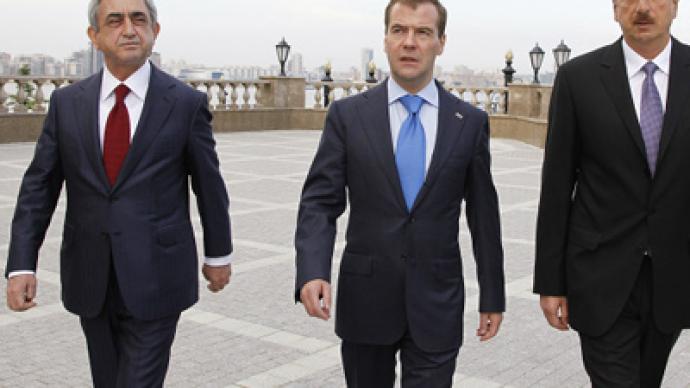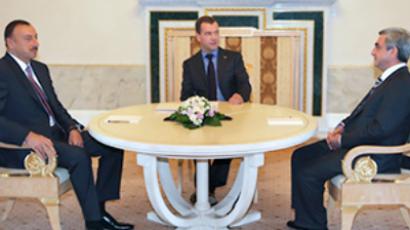Summit on Nagorno-Karabakh settlement brings no breakthrough

Armenia and Azerbaijan have failed to come to an agreement over the basic principles for a settlement of the Nagorno-Karabakh issue at a summit hosted by Russian President Dmitry Medvedev in Kazan.
However, in a joint statement on the results of the Friday meeting, the sides stated that there is progress on the path to seeking a resolution to the dispute.The talks between Medvedev and Azeri and Armenian leaders – Ilkham Aliyev and Serzh Sargsyan – lasted for about three hours.The summit in the Russian city of Kazan was the ninth round of trilateral talks since 2008.Despite high hopes that the meeting might finally lead to a breakthrough over the long-running territorial dispute between the two former Soviet republics, the sides have still to come to a compromise on a number of issues. Aliyev and Sargsyan expressed their gratitude to the leaders of Russia, France and the US – who co-chair the OSCE Minsk Group which mediates the conflict settlement – for their consistent efforts toward a Nagorno-Karabakh settlement. In their statement, the Azeri and Armenian presidents also highly appreciated Dmitry Medvedev’s personal efforts in helping the sides to iron out their differences. Coming to an agreement on the basic principles for a settlement of the Nagorno-Karabakh conflict was at the core of the Kazan talks. The efforts of the OSCE Minsk Group “are aimed at convincing the parties to finalize the agreement,” the Kremlin press service said prior to the talks, according to Itar-Tass. “This signal was sent to the leaders of Azerbaijan and Armenia in a joint statement issued by Dmitry Medvedev, Barack Obama and Nicolas Sarkozy, which they adopted on the sidelines of the G8 summit in Deauville on May 26."On the eve of the talks on Friday, Azeri President Aliyev said he was "rather optimistic" about the outcome of the summit. "The Personal participation of Russian President Dmitry Medvedev should allow the parties to reach an agreement," he told Euronews TV channel on Thursday, reports Interfax. "If the Armenian side displays a constructive approach and the political will to take an important step forward, the conflict could be resolved pretty soon," he added.His Armenian counterpart Sargsyan, on the contrary, said his expectations were not so high.In an interview with Euronews he noted that “optimism is a good thing, but I would rather be constructive and I must say my expectations are not that great”. The president stressed that Yerevan is against making any unilateral concessions. “We are for bilateral concessions, but must we make concessions with a state that is prepared to train weapons on us?” he wondered.“As I told the Council of Europe, the European Committee against Racism and Intolerance noted in a recent report on Azerbaijan that there is intolerance and anti-Armenian sentiment. This is not the case in Armenia. We must end this anti-Armenian prejudice and build a future on mutual trust.”The confrontation over Nagorno-Karabakh broke out back in 1988 when the region, mostly populated by Armenians, sought independence from Azerbaijan and announced its intention to join Armenia.In 1991, the Nagorno-Karabakh Republic was founded. Azerbaijan tried to regain control over the territory and the conflict escalated into a full-scale war in whereby around 30,000 people were killed. The conflict ended in 1994, with Nagorno-Karabakh’s independence remaining unrecognized and the region remaining a part of Azerbaijan, according to Baku’s legislation. Yerevan has been supporting the Nagorno-Karabakh region, representing its interests in an official capacity.Since 1994, talks to determine the status of the disputed region have been conducted within the framework of the Minsk Group of the Organization for Security and Co-operation in Europe (OSCE). The group proposed the basic principles for a settlement of the conflict – known as the Madrid document – in 2007.













